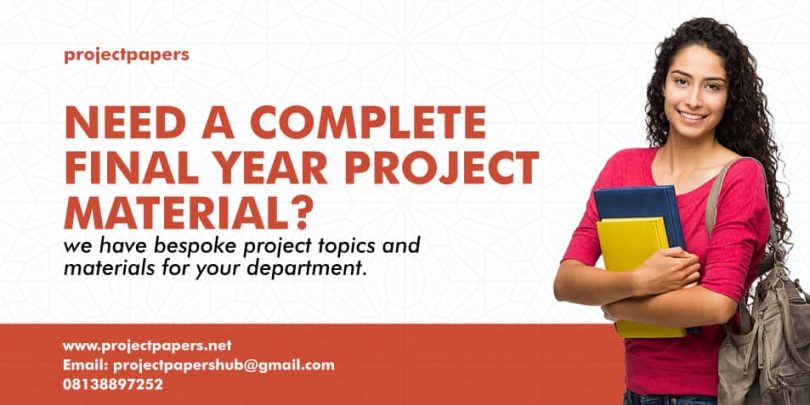Advertisements
Challenges and Prospects of Economics Education in Nigeria Tertiary Institutions. A Case Study of Ibadan Polytechnic
Content Structure of Challenges and Prospects of Economics Education in Nigeria Tertiary Institutions. A Case Study of Ibadan Polytechnic
- The abstract contains the research problem, the objectives, methodology, results, and recommendations
- Chapter one of this thesis or project materials contains the background to the study, the research problem, the research questions, research objectives, research hypotheses, significance of the study, the scope of the study, organization of the study, and the operational definition of terms.
- Chapter two contains relevant literature on the issue under investigation. The chapter is divided into five parts which are the conceptual review, theoretical review, empirical review, conceptual framework, and gaps in research
- Chapter three contains the research design, study area, population, sample size and sampling technique, validity, reliability, source of data, operationalization of variables, research models, and data analysis method
- Chapter four contains the data analysis and the discussion of the findings
- Chapter five contains the summary of findings, conclusions, recommendations, contributions to knowledge, and recommendations for further studies.
- References: The references are in APA
- Questionnaire.
Chapter One of Challenges and Prospects of Economics Education in Nigeria Tertiary Institutions. A Case Study of Ibadan Polytechnic
INTRODUCTION
BACKGROUND OF THE STUDY
The growing significance of economics to the nation constitutes a fundamental reason for the need to propagate economic Education in tertiary institution. According to Adu and Ayenia (1998), Economic education impacts significantly on the level of economic activity thereby increasing Business output and sales volume. It also increases value added output, per capita income, reduces poverty and increases the wealth of the nation. Economics education seek to provide an understanding of the current state of, and efforts to develop the curriculum, materials and pedagogical techniques of economics employed in the teaching of economics at all educational levels; and the research to determine the effectiveness of alternative instructional techniques in economics, the level of economic literacy of various groups, and factors that influence the level of economic literacy. W.E. Becker (2001). According to Walker in Oyedeji and Popoola (1989), economics is viewed as the nature and causes of wealth of nations. Also Marshal (1989) stated that economics is the field of study which focuses on mankind in the ordinary business life. Agu (1981) stated that economics is a social science which studies a particular aspect of social behavior. In contemporary society economic is viewed as the science which studies the process and institutions which govern the satisfaction of the limitless human wants within the limits imposed by availability of resources which have alternative uses. The study seeks to appraise the challenges and prospects of economics education in Nigerian tertiary institutions. A case study of Ibadan polytechnic.
STATEMENT OF THE PROBLEM
The teaching and development of economic education faces some challenges which imposes limitation to the understanding and propagation of the subject. Adu (2002) postulate that the issue of teacher commitment and effectiveness constitute a challenge, while there no adequate trainings and facilities provided to boost the capacity of teachers. The problem confronting the study is to appraise challenges and prospects of economics education in Nigerian tertiary institutions. A case study of Ibadan polytechnic.
Advertisements
OBJECTIVES OF THE STUDY
The Main Objective of the study is to appraise the challenges and prospects of economics education in Nigerian tertiary institutions. A case study of Ibadan polytechnic. The specific objectives include:
- To establish the efforts of government towards ensuring effective teaching of Economics Education.
- To identify the challenges faced by the Economics Education teachers towards ensuring effective teaching of Economics Education in the Polytechnic Ibadan.
- To inquire the attitude of students towards learning Economics Education in the Polytechnic Ibadan.
RESEARCH QUESTIONS
i. What are the efforts of governments towards ensuring effective teaching of Economics Education?
ii. What are the challenges faced by the Economics Education teachers towards ensuring effective teaching of Economics Education in the Polytechnic Ibadan?
iii. What is the attitude of students towards learning Economics Education in the Polytechnic Ibadan?
STATEMENT OF THE HYPOTHESIS
Ho1: There is no significant difference between the efforts of government towards ensuring effective teaching and students’ performance in Economics Education.
Ho2: there is no significant relationship between the challenges faced by the Economics Education teachers and effective teaching of the subject.
SIGNIFICANCE OF THE STUDY
The study is an appraisal of the challenges and prospects of economics education in Nigerian tertiary institutions. A case study of Ibadan polytechnic. It provides relevant data for the effective formulation and implementation of policies to enhance the realization of envisaged objective.
LIMITATION OF THE STUDY
The study was confronted with logistics and geographical factors.
DEFINITION OF TERMS
ECONOMIC EDUCATION DEFINED
Economics education seek to provide an understanding of the current state of, and efforts to develop the curriculum, materials and pedagogical techniques of economics employed in the teaching of economics at all educational levels; and the research to determine the effectiveness of alternative instructional techniques in economics, the level of economic literacy of various groups, and factors that influence the level of economic literacy.
ECONOMICS DEFINED
Economic is viewed as the science which studies the process and institutions which govern the satisfaction of the limitless human wants within the limits imposed by availability of resources which have alternative uses.
EDUCATION DEFINED
Education is viewed as the process of inviting truth and possibility. It is the wise, hopeful and respectful cultivation of learning undertaken in the belief that all should have the chance to share in life.
Advertisements


